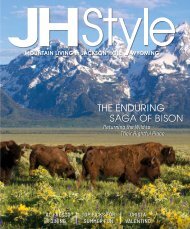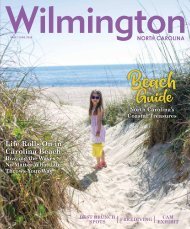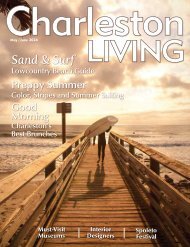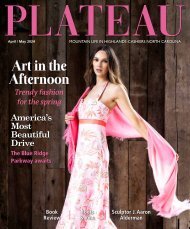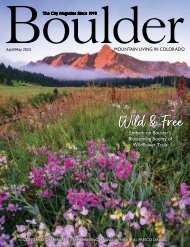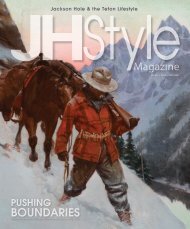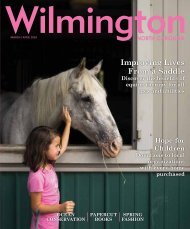Charleston Living Magazine Nov-Dec 2021
We end the year with a bang - festive holiday tablescapes to help set the table for entertaining, and holiday fashion for the latest trends in what to wear this season. We also showcase our top picks for dining over the holidays.
We end the year with a bang - festive holiday tablescapes to help set the table for entertaining, and holiday fashion for the latest trends in what to wear this season. We also showcase our top picks for dining over the holidays.
- No tags were found...
You also want an ePaper? Increase the reach of your titles
YUMPU automatically turns print PDFs into web optimized ePapers that Google loves.
PHOTO LIBRARY OF CONGRESS, MUSIC DIVISION; PRINCIPAL CHURCH, CHARLESTON. MEYER, A., ARTIST, 1861<br />
There are more<br />
than 400 houses<br />
of worship in<br />
<strong>Charleston</strong>, many<br />
from the city’s<br />
earliest days.<br />
here are some other traditions and a little<br />
information on their historic contexts that<br />
in my humble opinion, should keep a prominent<br />
position during the holiday season.<br />
Madeira and Pecan Pie<br />
This deliciously sweet, fortified wine, originally<br />
imported by the Portuguese from the<br />
Canary Islands, boasts an exotic bouquet<br />
with notes of dates, toffee, roasted nuts and<br />
caramel brought to full flavor by being stored<br />
at a high temperature. As such, it was very<br />
popular among Southern Colonists due to<br />
our extremely warm weather. It was generally<br />
the practice to store the barrels in the attic<br />
during the hot summer months.<br />
Madeira wine was a<br />
popular fortified wine<br />
in the early aughts.<br />
“Madeira Wine: A<br />
Parody on the Willow”<br />
song was created in the<br />
1800s.<br />
As the weather cooled in the late fall,<br />
the barrels were tapped just in time to toast<br />
the Christmas season. Madeira was so highly-prized<br />
that Louis Manigault stored 2,100<br />
bottles in the Old Powder <strong>Magazine</strong> that<br />
still stands on Cumberland Street downtown<br />
and instructed that it “remain there until my<br />
death, and then to be divided equally among<br />
my sons and daughters.”<br />
While my own children are too young<br />
to imbibe, the best way to help them cultivate<br />
a taste for Madeira (find some at area liquor<br />
stores) is to tipple a couple tablespoonfuls<br />
of the good stuff into our family pecan pie<br />
recipe. The first well-documented recipe for<br />
pecan pie only dates back to 1898.<br />
The confection grew in popularity after<br />
a similar recipe began to appear on the labels<br />
pasted onto bottles of Karo syrup in the<br />
1920s. So technically, this culinary delight is<br />
only now approaching its first century as a<br />
Southern tradition. Nonetheless, one taste<br />
(especially with the Madeira) and you’ll<br />
never want Christmas without it. And by the<br />
way, my grandfather would wish for me to<br />
coach you on the pronunciation. According<br />
to the late Samuel Edward Lowry, the word<br />
is pronounced “puh-KAHN.” He would then<br />
wink wickedly and add “A pee can goes under<br />
the bed at night.” (Grandpa being a little<br />
bit wicked on Christmas is also traditional. If<br />
he gets too wicked, hide the Madeira.)<br />
Fireworks<br />
No one seems to know why or how the<br />
discharging of pyrotechnics and/or firearms<br />
as a celebration of Christ’s birth became a<br />
holiday tradition, but if you grew up in the<br />
South, you are well accustomed to the report<br />
of more than a few fusillades on Christmas<br />
Day. In fact, this custom was so prevalent in<br />
old <strong>Charleston</strong> that the legislature passed a<br />
law in 1750 prohibiting “the firing and flinging<br />
of squibs, crackers, and other fireworks”<br />
to avoid the endangerment and annoyance of<br />
people passing in the streets.<br />
According to historian Nic Butler of the<br />
<strong>Charleston</strong> County Public Library, (Podcast,<br />
<strong>Charleston</strong> Time Machine, Episode 138)<br />
a reminder of this 1750 law was published<br />
in the local newspaper every <strong>Dec</strong>ember for<br />
many years following. But apparently it became<br />
a happy tradition to completely ignore<br />
the newspaper’s admonition. In October of<br />
1772, a local complaint was registered in<br />
regards to the “illegal mirth of a few inconsiderate<br />
people” engaged in “the common<br />
practice of firing guns on the eves of Christmas,<br />
and on the mornings of the New Years.”<br />
If you plan to keep this particular tradition<br />
alive, please check with your local neighborhood<br />
association for policies regarding<br />
the discharging of firearms. And remember<br />
to always wear safety goggles.<br />
Listening For Christmas to ‘Fall’<br />
In direct contrast to all the noise you can<br />
make with a variety of explosive devices,<br />
many Southerners enjoy solitude and the accompanying<br />
silence on Christmas Eve. We<br />
sit up and listen for Christmas to fall. For an<br />
explanation, I defer to the celebrated writer<br />
Archibald Rutledge and paraphrase from his<br />
book Plantation Game Trails (1921): In the<br />
South, as perhaps is the case nowhere else in<br />
the world, there are many superstitions associated<br />
with Christmas. One of these, which<br />
amounts to genuine belief, is that “Christmas<br />
falls.” Perhaps someone once heard it said<br />
that “Christmas falls on a Friday this year.”<br />
Whatever the origin of this expression, folks<br />
on the plantation firmly believed that the<br />
coming of this great day was heralded by<br />
some mighty convulsion of nature. Being a<br />
romantic like Mr. Rutledge, I have often sat<br />
up until midnight on the eve of the Holy Day<br />
waiting to hear Christmas “fall.” Perhaps the<br />
most spiritually advanced do indeed distinctly<br />
perceive at the precise moment a mystic<br />
far-off detonation. As for me, if someone<br />
whispered, “Did you hear?” I would answer<br />
“yes,” and in my heart of hearts hope that it<br />
was true. •<br />
Storyteller Tim Lowry is a Southern raconteur<br />
from Summerville. Learn more at<br />
www.storytellertimlowry.com.<br />
<strong>Nov</strong>ember/<strong>Dec</strong>ember <strong>2021</strong> | 55











